Millennium Challenge Corporations (MCC) has hit the headlines, recently. Enlisted as the national pride project, it also came to public debate with some suspicions arising from the ruling party. At the time when the debate on whether it should be endorsed by the federal parliament or not, Khabarhub’s Raghab Sharma talked to Khadga Bahadur Bisht, the Executive Director of Millennium Challenge Account Nepal (MCA-N), the implementing authority for the MCC in Nepal, to explore more about its origin, the functioning, nature of the project and its impacts. Excerpts:
MCC or MCA Nepal is in dispute in Nepal lately, as the ruling Nepal Communist Party (NCP) seems divided on the issue. The party entrusted the issue to its Secretariat to decide the MCC’s fate. The opposition seems to be willing to get it endorsed instantly. Although it’s a grant, what’s the main cause of this dispute?
On why this became debatable seems, due to the concern thinking, principally, it may be a strategic issue. As it is sometimes questioned asking whether it is a part of Indo-Pacific Strategy, they seem to be wondering whether that is an alliance or any other strategy.
I think the Ministry of Foreign Affairs will better clarify the issue, as it is the grant applied since 2011. It has gone through preliminary study and is forwarded ahead till date as Nepal has been qualified for this project. Nepal got this project through competition worldwide.
It has gone through various phases before selection. After completion of so many phases and levels of discussions, when it has come to the implementation level, I think, the discussion as it’s going on is not timely, actually.
When was MCA Nepal established?
This office was established in June, 2018. Prior to it, opening of MCC has a long story. With a bit different approach than other US Aid agencies, MCC is focusing on infrastructure building project as it makes development tangible.
It selects the country where the government offers freedom for investment, where there is transparency, justice, gender equality; actually there are 20 such indicators considered prior to selection of such mega project. Nepal is luckily selected for it.
It invests in the projects or master plan chosen by the domestic countries i.e., the country applying for it. MCC does not impose its project, it works on the project the country has chosen. So, there should be the ownership of the country.
But at the time of identifying the project and choosing the project, they open a domestic office; that office is called the office of millennium challenge (OMC), in the context of Nepal OMCN.
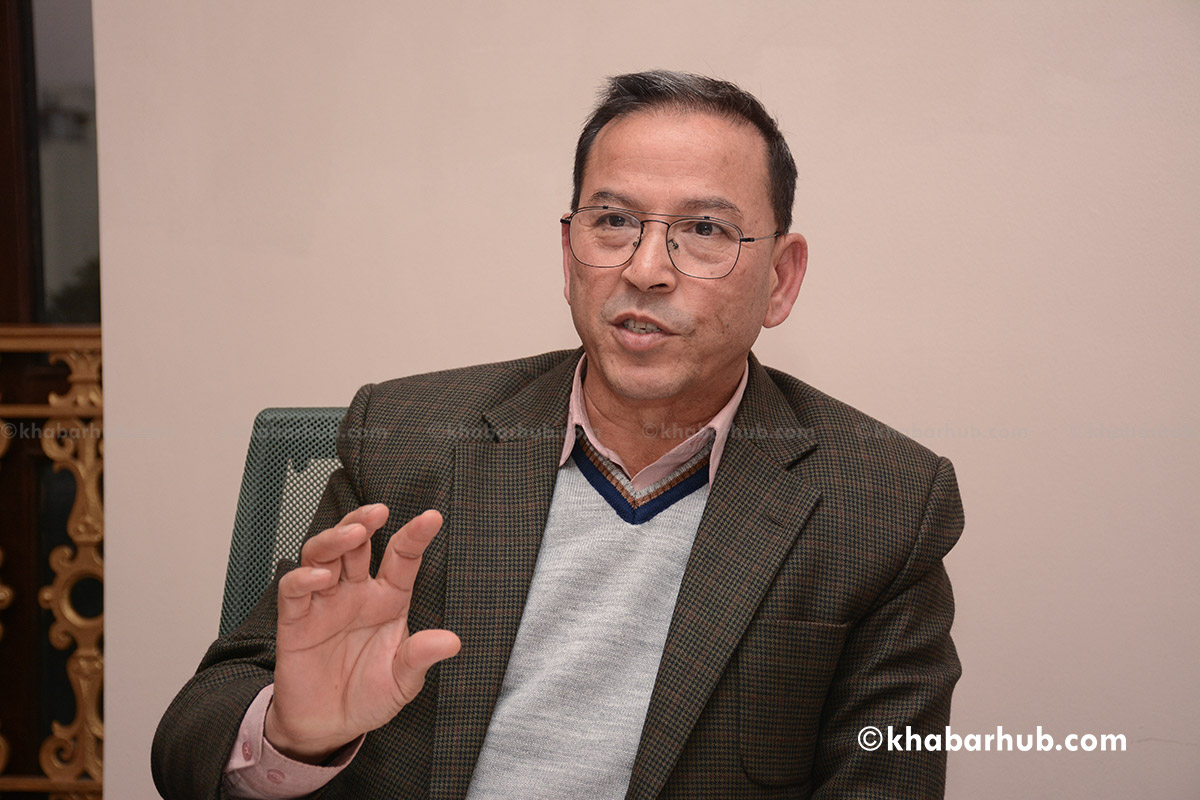
After the studies conducted by such office for one or two years, they identify the project. In case of Nepal, it had shown four constraints: laws are not much matured; labor relationship is not much good, as the strikes are likely to disrupt the project; electricity; and the last but not the least, road.
Upon serious consideration on such constraints they concluded, the first two could improve in the days to come though then at transitional phase they seemed constraints to the project.
So, it decided the latter two: road and electricity. A thoughtful consideration later made them conclude that majority of the fund should go for transmission line extension project, a little in road network to ensure ownership and promote public concern on it.
Two issues: ratification from the parliament, and consent from India have become two major concerns for the people skeptic about the intent of MCC itself. Ratification is national issue for parliament. Why did it seek Indian consent?
That’s a very important question. Making the logical framework for line, it has made a logic related to how can this project attain 10% proportion economic rate of return. This much can be generated in the country, this generation can be taken to the load center, when more electricity is generated in Nepal’s system, for its placing we have to make cross borderline so that we can export electricity to the countries like India, Bangladesh etc.
The revenue which is collected from the sale of electricity and also the rate of return shall be 12%. The project can be held logically viable only under such conditions.
Failure to export electricity makes the investment in such megaproject useless. The Dhalkebar transmission line had already become very matured, so Gorakhpur- Butwal line, four cross-border line were identified in our master plan then.
In the meantime, to make the transmission line in other’s country, one needs the consensus. So, it’s not taking permission actually, it’s making consensus, which is mentioned in the conditions for the project. It is so because, as per MCC guideline, they do not invest in the project that cannot ensure 10% rate of return.
To ensure 10% rate of return, electricity has to be sold, actually our target is for 12%. To sell it to India, India’s consensus is important in long run. In fact, this procedure or let’s say the phase of dealing with India is already completed.
The debate on it is not much rational because, on October 15, a meeting held in Bageloru in which, our Secretary at the Ministry of Energy, had led the Nepali side and his Indian counterpart Subhash Chandra Garg had led the Power Ministry of India had agreed and signed an agreement on this matter.
All the rest is done, now we have to go for implementation. We have to make the 120 KM extension line. What agreement is done is actually, India’s power company, Power Grid Company of India (PGCI) and the Nepal Electricity Authority will establish a company in 50/50 ownership.
That company will implement a line. It brings loan, it adds its equity, and then arranges for the debt; this type of agreement is made in 80/20 formula. The modality is finalized. No consent is required now. Now it’s time for implementation. One chapter is finished. We have to go next.
Now let’s go to the question, why should we go for ratification from parliament. The term compact is used for the project of big-budget, they call threshold for a small budget. Article 7 of the compact says, if while executing this project, if the domestic law, not the national constitution but law only, contradicts with the compact, the compact prevails.
We have signed many such contracts before. If you look at the contract project development agreement GMR of Upper Karnali Sutlej Hydro electricity’s agreement meant for Arun 3, or 60 MW Khimti project I was worked for before you will find such provisions included.
They include such provisions for the security of their investment. As no company can prohibit the government from changing the law, as it’s the case in which two sovereign states are the party, it included the provision saying provided the local law contradicts with this compact, the provisions in the compact shall prevail.
The Vienna Treaty convention hails that if any international law contradicts the local or domestic law, both parties should abide by the Vienna Convention. Vienna Convention on such issue says that international prevail over domestic law. Nepal though not a signatory of the Vienna Convention, it’s a compliance nation.
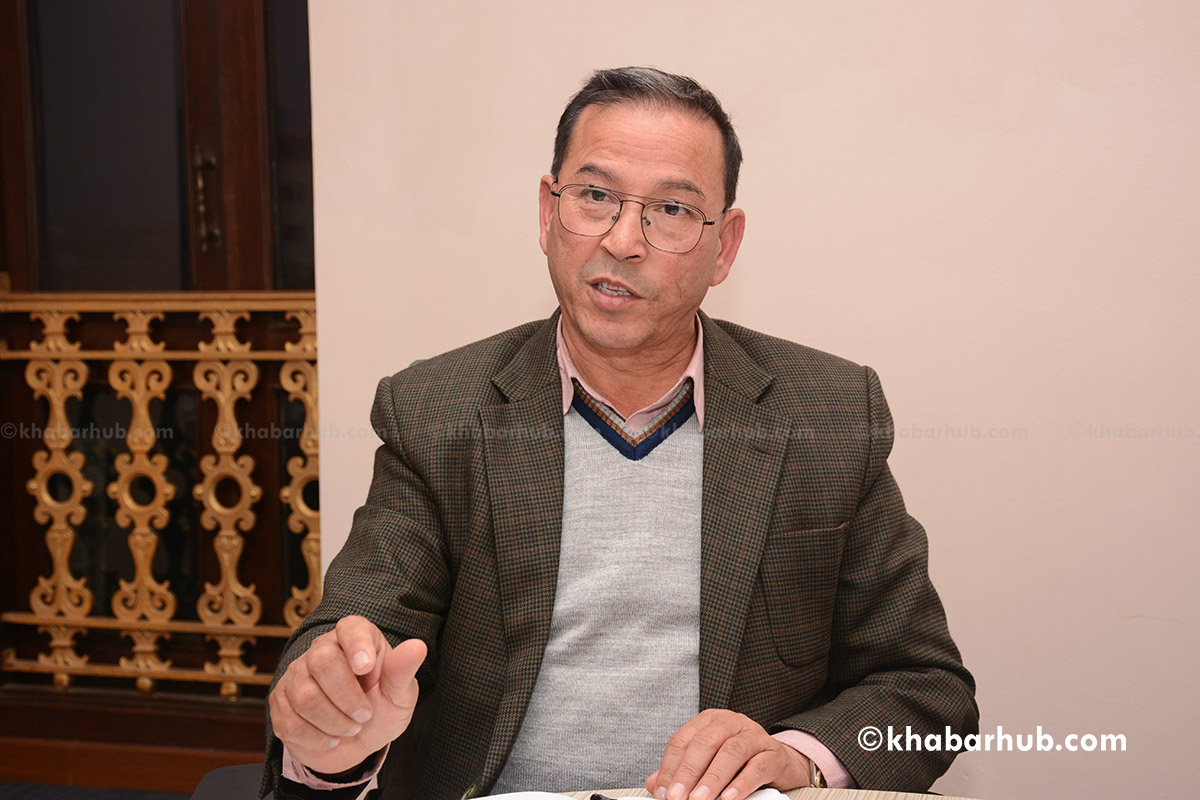
As we are governed under Ministry of Finance, we sought some legal consultation from the ministry, then the Finance Ministry consulted the Ministry of Law and from them came the suggestion that provided the agreement was ratified by the federal government, even if other levels make the laws against it, which may happen at any stage of the implementation, the compact shall prevail and this will ensure the uninterrupted execution of the activities we agree to accomplish as per the agreement.
It’s for the protection, for example, if a take the Nijgadh airport in a lease for 50 years, before the agreement matures if the government levies undue tax upon me, I need protection for it; it’s only for legal overhand.
Why is this kind of question raised everywhere?
Actually, what such questions actually hint is how updated we actually are aware of the legal provisions, international practices, etc. it tells how many agreements we have done.
Whatever I have learned, I speak; that’s the practice. If the ‘protection against changing law’ is regarded as the provision set between two sovereign nations it will be taken differently, the opposing voices calm down realizing such can be the practices at the international level.
But if it is presented negatively saying how MCA’s law can supersede Nepal’s law, then it’s likely to be taken as a challenge, undermined instance or dominating the sovereignty, this may create a problem.
We have clearly mentioned what MCC wants to incorporate: constructing transmission lines, building substations, and maintaining roads. We have asked to facilitate the law which can help execute the above-mentioned activities; we have not asked for permission to do whatever we like to do. The fact seems to be twisted for certain reasons.
Do you see anyone’s role in that “twisted”?
I should not go to that speculation. I am a staff recruited by the government.
One hypothetical question in this regard, provided the parliament doesn’t ratify the contract, what will be the next step?
In this, actually, we hope the parliament shall ratify it. If not, as that part is not discussed before as the project has been selected as per the government’s proposal for it, other decisions will be taken after such a situation occurs.
As Executive Director, have you felt any pressure while working for MCA especially in the implementation issue or some other issues?
From outside, no. We have worked with local representatives so far. As the project is included as the project of national glory, we have been getting good support. We talked with chief district officers and local representatives of many places.
When they know that this project of national pride is going to be completed in 5 years and they see the model, they are very excited. We have really got good support. We are going to make the largest substation of Nepal in 365 ropani, in Nuwakot. 1100 MW can be taken to the substation.
Budhi Gandaki, Trishuli and Marshyangdi corridor’s all electricity will be taken to it. It’s the substation to be connected that way. The agency is under the finance ministry, so the local representatives and especially the local administration is cooperating a lot.
Sometimes in some places, we find the perception that as the project is an American project, they expect higher payment. We have not acquired /purchased the land yet, their expectation may come to the foreground at the land acquisition phase.
Is the people’s interest going to be addressed? Will they be happy in the end?
In all our meetings and presentations we have found the people surprised with the presentation and our commitment. Taking 2 years, we are doing EIA when the Initial Environment Examination (IEE) is thought to be enough for transmission lines.
The IEE could have been completed in just 3 months. There has to be one public hearing in one district; we have 10 districts in the project and we have conducted the hearing in all municipalities.
We have completed around 100-150 consultation. We have handled the issue very seriously, we have heard the local’s grievances. We are always available, whenever they want us, they find us in their reach.
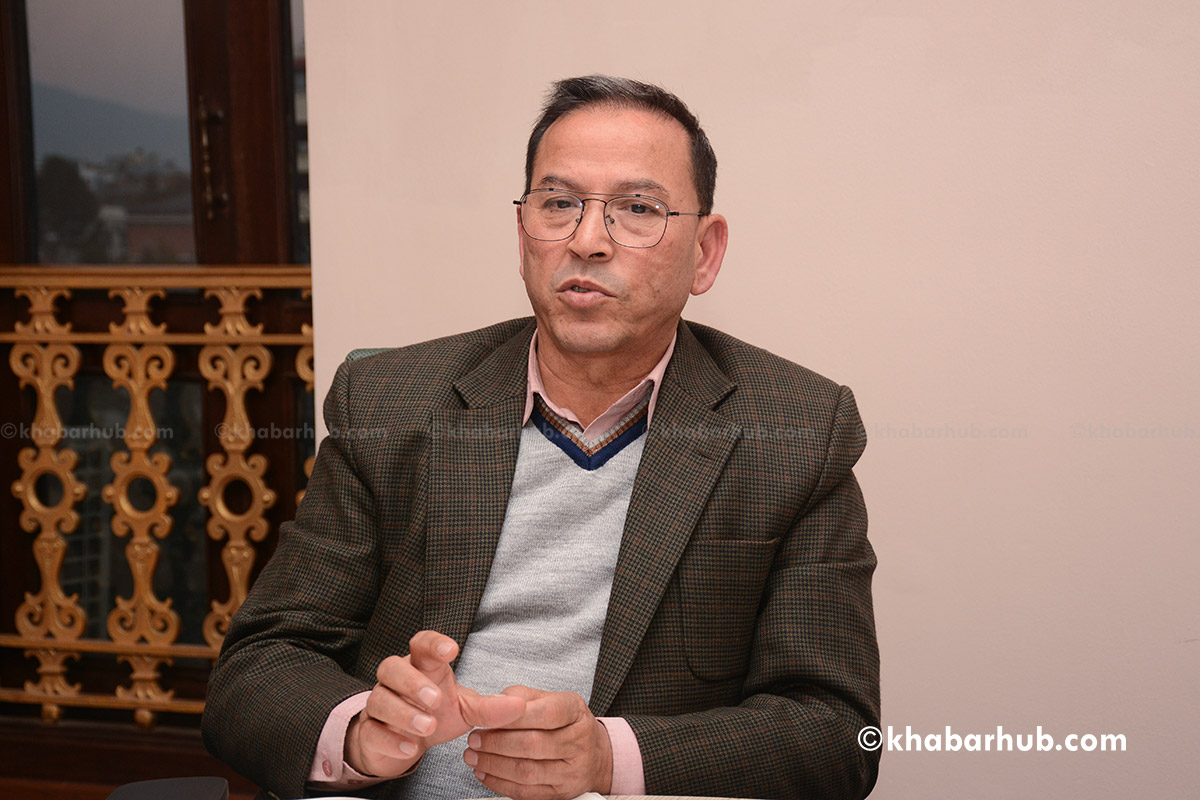
People and even the high officials at the district and regions get surprised at the way we work. There are 900 towers, some at the top of the hills, others in the steep sides and some few places the plains of terai.
The transformer of 160 tons carrying to the steep hills or top of the hills too, that’s a big challenge; so people are overwhelmed by our presentation. They are happy and helpful. Yes, their high expectations may trouble at land acquisition.
Are you going to pay them as per the government rates?
Yes, it will be somehow like that. But not exactly. We have our own valuation mechanism. We have indicators, we use them for valuation of the land.
What about technology and manpower? Do Nepali manpower and technology suffice in this regard?
Most of the contractors are international ones. There is a misconception that MCC gives the key responsibilities to the US citizen. I request you not to edit this part and include it for the public.
Now the US government has executed such projects in 37 countries. I think there are big programs in 17 countries; in none of them, they have any US Contractor/bidder. So, it’s not meant for US companies alone.
Anyone can bid fulfilling our criteria, nationality or country of origin has nothing to do in such projects; Nepali are most welcome as well.
Yes, I was talking about manpower. In it, when an international bidder comes, the bidder is likely to come with its technology and expert or supervising manpower; however, local manpower has to be searched in Nepal. Skilled manpower like some engineers is here in Nepal. Unskilled labor is also in galore.
Some tasks like monitoring, reporting, etc. will be done by MCA here.
Do you have anything else to say as a director?
What I want to say is such opportunities are rare. In 70 years of Nepal-US relationship, the superpower country the USA has decided to execute this project as it wanted to do something with big impacts.
This project was announced in Mexico 2008, by George Bush. This was meant to launch big and impact making programs with the mandatory provision of country ownership. Nobody from MCC signs in the project paper, only MCA i.e. the destination govt. facilitated body signs on behalf of MCC.
In Nepal, I sign the document. I am liable to the board, Secretary at the Ministry of Finance here is the chairperson of the board I have to be liable to. Nepal entity should work on it, it has to be finished in 1865 days.
This model is practiced in many countries and it has become successful in most of them. The only failure those countries have is, they are not able to empty the budget. Nepal should take advantage of this opportunity.


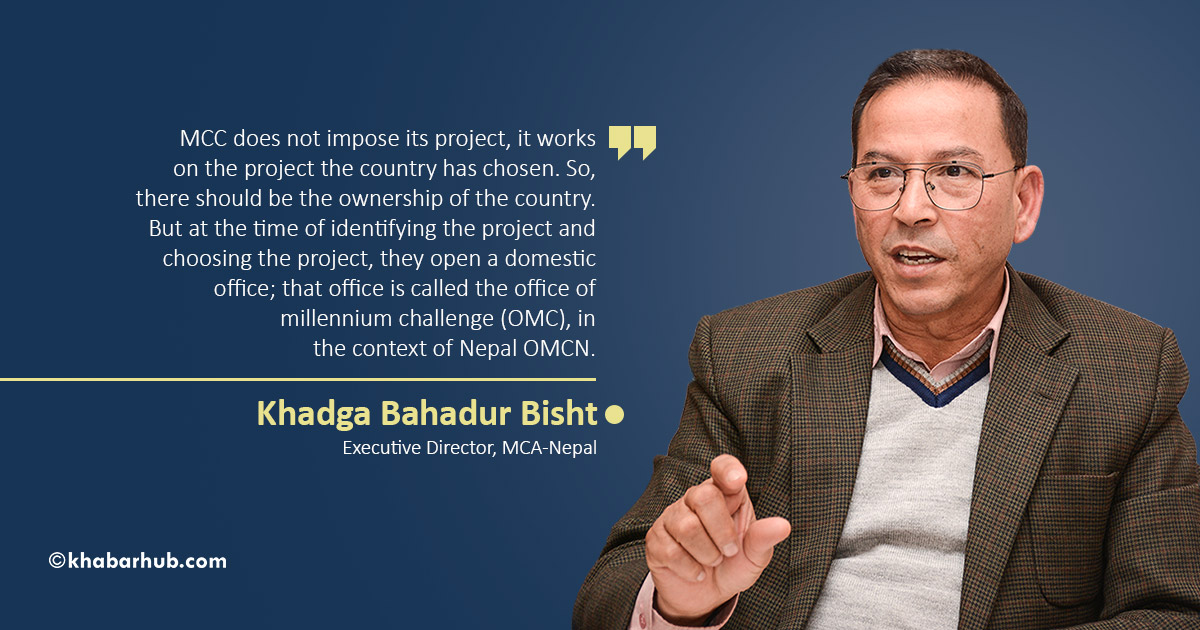
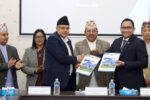



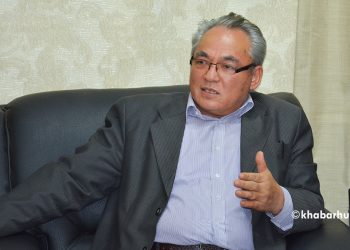

Comment